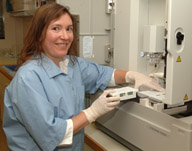National Science Foundation grant to help share research with high schools
January 26, 2007
A new National Science Foundation award to Idaho State University will give ISU doctoral and undergraduate students the opportunity to share cutting-edge genetic and evolutionary research with high school teachers and, ultimately, high school students.

ISU assistant professor of biological sciences Dr. Marjorie Matocq has received a $509,896 NSF award for the project titled “CAREER: The roles of ecology, behavior, and morphology in maintaining species boundaries – demonstrating evolutionary processes to high school students in Idaho.”
Matocq received notice of the award this month and it will go into effect in August. CAREER, a National Science Foundation Faculty Early Career Development Program, offers the foundations’s most prestigious awards in support of those individuals who most effectively integrate research and education.
“Through the research we will be conducting in the time of this award not only will we be educating the graduate and undergraduate participants in the work but we will also extend components of the research into a high school program,” Matocq said.
Matocq will incorporate her research on the processes that generate and maintain aspects of biodiversity into a high school outreach program. Specifically, this program will train local high school biology teachers in molecular genetic techniques and collaborate with them to present these techniques to their students and integrate these activities into other components of the curriculum.
“The outreach program will be a model partnership between high schools and universities, cost-efficiently exposing students to modern molecular genetics and evolutionary research,” Matocq said. “The techniques they’ll be learning in the high school classroom are some of the fundamental methods used in a rapidly-expanding number of professions including medicine, biotechnology, and basic research.”
In terms of the research component of the award, Matocq explains that the conservation of biodiversity requires an understanding not only of the factors that contribute to diversification and speciation but also of the population dynamics that allow species to remain distinct from one another. Matocq will integrate a series of field and lab studies to identify how ecological, behavioral, and morphological factors allow hybridization but prevent widespread gene flow (introgression) between two species of woodrat, Neotoma fuscipes and N. macrotis. Specifically, she will identify where the barriers or filters to genetic
introgression occur in the continuum of reproduction from spatial opportunity for interaction, to mate choice, gamete transfer, survivorship and reproductive success.
The integrated research and educational activities will train students at various educational levels in the scientific method with special emphasis on molecular genetics and evolutionary processes. These individuals include high school students from the Shoshone-Bannock Tribes, ISU undergraduates, ISU doctoral students, and local high school biology teachers.
At the university level, this grant will train two PhD students in Matocq’s research area, will expose at least 10 undergraduate students to her research, and will provide support for one postdoctoral researcher.
“The ISU students will have the opportunity to study the woodrats in their natural environment as well as in the captive colony in the lab,” Matocq noted. “Having the animals in the laboratory allows us to study aspects of their behavior in much greater detail and also provides added opportunities for ISU undergraduates to get involved in research.”
Matocq’s NSF award comes shortly after the ISU biological sciences department received a $1.8 million NSF grant to continue the Graduate Fellows in K-12 Education (GK-12) project for another three years. Dr. Rosemary Smith of the department of biological sciences is that grant’s principal investigator. Co-investigators are Drs. Lawrence Stout of the College of Engineering, and Richard Inouye and Paul Beardsley, both in the ISU biological sciences department. It is a continuation of a $1.9 million NSF grant received in 2004 to augment science and mathematics education of southeast Idaho students in grades kindergarten through 12.
Categories:
